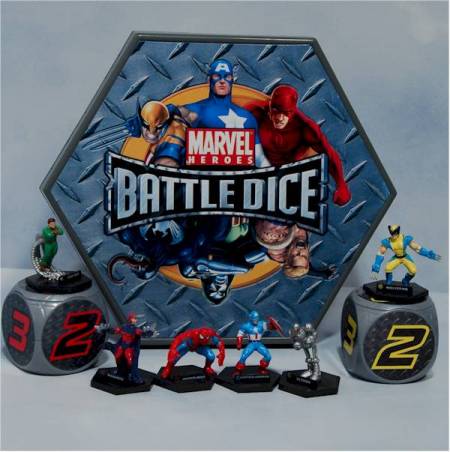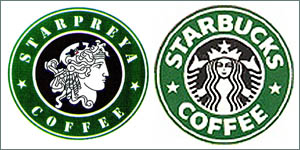Entries in Trademark Infringement (368)
Starbucks Appeals STARPREYA Rulings
Bloomberg News reports today that Starbucks Corp. has appealed the Patent Court of Korea’s refusals to cancel the STARPREYA word and design marks on confusion grounds. Korean coffee seller Elpreya Co., owner of the STARPREYA marks, responded that “Starpreya’s victory is a done deal….”
Seattle Trademark Lawyer’s recent discussion of this dispute is available here.
Ninth Circuit Affirms Preliminary Injunction Denial in BATTLE DICE Infringement Case

On December 8, the Ninth Circuit affirmed the Central District of California’s denial of Illektron, LLC’s motion for preliminary injunction to enjoin Playmates Toys, Inc. from using the trademark BATTLE DICE in connection with its children’s game. In July, the Central District found that Illektron was not likely to prove at trial that Playmates’ use of BATTLE DICE in its “Marvel Heroes Battle Dice Fast Action Collectible Figure Game” infringed Illektron’s BATTLEZ trademark used in its BATTLEZ collectable card and dice games. In an unpublished decision, the Ninth Circuit concluded that the Central District had correctly identified the legal standards for likelihood of confusion, balance of hardships, and the possibility of irreparable injury and, therefore, did not rely on an erroneous legal premise or abuse its discretion in denying the motion.
Starbucks Vows Appeal of South Korea Court's STARPREYA Ruling
On December 18, The Seattle Times reported that Starbucks Corp. plans to appeal a South Korean court’s refusal to cancel the registration of Seoul coffee company Elpreya’s STARPREYA trademark registration based on the alleged infringement of STARBUCKS. 
Says Starbucks Chairman Howard Schultz: “We’re going to refute that; there will be no letup.”
“We have no patents or technology. What we have is the reputation of the company and obviously the trademark.”
Press reports describing the Patent Court of Korea’s September 20 decision are available from the Seattle Post-Intelligencer and The Korea Times.
Western District Dismisses Infringement Suit Against Sagem Morpho
On December 15, Western District of Washington Judge Ricardo Martinez granted defendant Sagem Morpho, Inc.’s motion for summary judgment dismissing plaintiff James Childers’ trademark infringement case. Seattle Trademark Lawyer reported December 6 that Judge Martinez dismissed plaintiff’s claims against co-defendant Sagem Defense Securite for lack of personal jurisdiction but refused to dismiss such claims against SMI. The action arose from SMI’s alleged infringement of plaintiff’s BIOCERT trademark through the use of X-BIOCERT on SMI’s affiliate’s website, www.xelios.com.
SMI argued in its motion and reply brief that plaintiff could not pursue his Lanham Act claims because he failed to present admissible evidence demonstrating that SMI infringed the BIOCERT mark directly or vicariously, or that it otherwise contributed to the alleged infringement of that mark.
In its opposition brief, plaintiff responded that his evidence established that X-BIOCERT and BIOCERT were sufficiently similar to justify a claim of consumer confusion. He also argued that SMI used X-BIOCERT in commerce by offering a software product called “PC Login Pro Suite 5 with X-Biocert” for sale to one of plaintiff’s employees.
Judge Martinez sided with SMI. The Court found “[t]here is no dispute that defendant did not offer to sell, or actually sell, PC Login to [plaintiff’s employee] or anyone else in the United States. Nor did defendant distribute or advertise PC Login to [plaintiff’s employee] or anyone else in the United States.” The Court also found that plaintiff failed to present any facts demonstrating that the person it communicated with about PC Login “worked for, or represented, defendant in any capacity.” Therefore, the Court concluded that “plaintiff has failed to raise a genuine issue of material fact with respect to the threshold element that defendant used the allegedly infringing trademark ‘in commerce….’”
Plaintiff Alleges Sufficient U.S. Injury to Support Lanham Act Jurisdiction
On December 6, Western District of Washington Judge Ricardo Martinez found that plaintiff James Childers pleaded sufficient harm felt in the United States from alleged trademark infringement to defeat defendant Sagem Morpho, Inc.’s (“SMI”) motion to dismiss for lack of subject matter jurisdiction.
 Childers, d/b/a Artemis Solutions Group, filed suit against SMI and other defendants alleging that SMI’s subsidiary’s use of X-BIOCERT as a trademark in connection with biometric software is confusingly similar to plaintiff’s BIOCERT registered trademark that is also used in connection with biometric software. SMI argued in its motion that the alleged Lanham Act violations took place in France, by a French company, and not within United States commerce as required under the Lanham Act.
Childers, d/b/a Artemis Solutions Group, filed suit against SMI and other defendants alleging that SMI’s subsidiary’s use of X-BIOCERT as a trademark in connection with biometric software is confusingly similar to plaintiff’s BIOCERT registered trademark that is also used in connection with biometric software. SMI argued in its motion that the alleged Lanham Act violations took place in France, by a French company, and not within United States commerce as required under the Lanham Act.
Judge Martinez disagreed. He wrote:
“Plaintiff insists that his claims are solely focused upon the alleged infringement in the United States and the effect the infringement has had on United States commerce. Plaintiff argues that he has presented facts to support his claims of domestic application of the Lanham Act as well. In fact, nowhere in plaintiff’s Amended Complaint, or any other of his pleadings, is there mention of facts alluding to an extraterritorial application of the Lanham Act. Thus, the Court accepts plaintiff’s characterization of his claims.”
The court separately granted co-defendant Sagem Defense Securite’s motion to dismiss for lack of personal jurisdiction.